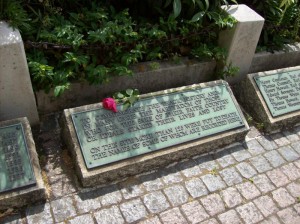
On 17th May 1536, Sir Henry Norris, Sir Francis Weston, Mark Smeaton, William Brereton and George Boleyn, Lord Rochford, were executed on Tower Hill. They had all been found guilty of high treason and sentenced to be hanged, drawn and quartered at Tyburn, but their sentences had been commuted to the more merciful death by beheading.
Today, I want to share with you an extract from The Fall of Anne Boleyn: A Countdown audio book about their executions. The audio book is currently on offer for $5 if you want to hear more – see www.madeglobal.com/downloads/fall-anne-boleyn-countdown/.
The photo you can see here is from the scaffold site on Tower Hill, where the men were executed, and I laid a rose there when I visited one May. It is across the road from the Tower of London and is near to London Wall (the Roman wall built c. AD 200) and next to the Tower Hill Memorial, which commemorates the men and women from the Merchant Navy and Fishing Fleets who died in World Wars I and II and who have no grave.